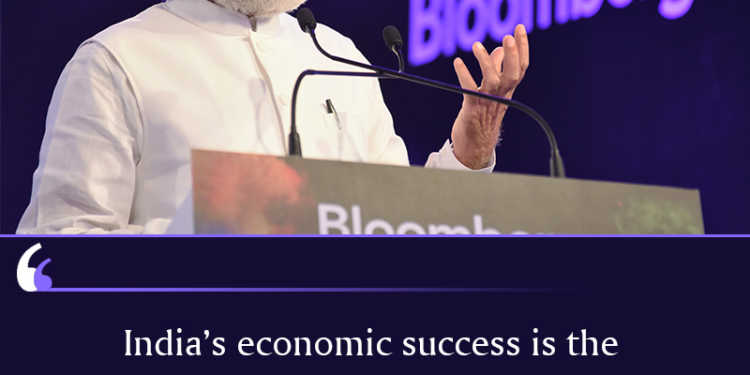PM Modi began his speech with a note of gratitude for Mr. Michael Bloomberg for his valuable advice that in the design of our Smart Cities Programme.
Modi asserted on the fact that the world has a lot of expectations from India, in terms of contributing to global growth. Modi touched upon three major areas. He described in great details, India’s economic growth. He outlined some of the administrative and policy reforms that his government created elaborated on an aspect of job creation.
Modi at Bloomberg: About Oil Prices dip
People call Modi the accidental Lucky PM for grabbing the chair of World’s biggest democracy when crude oil prices fell steeply. Here’s what he responded to them:
- Between 2008 and 2009 crude oil prices fell steeply from a peak of 147 dollars per barrel to less than 50 dollars. This was a steeper fall than between 2014 and 2015. Yet in 2009-10, India’s fiscal deficit, its current account deficit and its inflation rate, all got substantially worse. And this slide was from a higher base figure for all three. But in 2015-16, all three have improved, from a lower base.
- Many other emerging economies also depend on imported oil. If oil prices were the driver of success, those countries would all be showing similar results. But they are not.
- We have not been lucky with global trade or growth. Both are low, and have not helped us in terms of export stimulus.
- We have not been lucky with monsoons or weather. 2015 and 2014 have both been drought years. Drought was compounded by unseasonal hail storms. Yet food grain production has remained much higher, and inflation much lower, than in the last comparable drought year, which was 2009-10.
Modi at Bloomberg: Invitation to naysayers
PM Modi had a stern advice for the naysayers. He mentioned that there are some who find it difficult to digest and come up with imaginative and fanciful ideas to belittle his Government’s achievements. He said that India’s economic success is the hard-won result of prudence, sound policy and effective management. He stated that his Government was able to meet ambitious fiscal targets in each of the previous two fiscal years and that they have reduced the deficit even while increasing capital expenditure.
He said that India’s growth rate is acknowledged as the highest among major economies. In his characteristic sarcastic tone he said “There are some who remain confused and have said that the growth rate does not ‘feel’ right. Perhaps I can be of some assistance to them in reducing the confusion, by stating facts in place of feelings.”
Modi at Bloomberg: foreign direct investment
PM Modi stated that the net foreign direct investment in the third quarter of the current financial year was an all-time record. And there was a dramatic increase in certain important sectors. In the period from October 2014 to September 2015, FDI in fertilizer was 224 million dollars compared to just one million in the period October 2013 to September 2014; in sugar, it was 125 million dollars compared to just four million dollars; in agricultural machinery, it doubled to 57 million dollars from 28 million dollars. These are sectors that are closely connected with the rural economy. PM Modi expressed happiness about the fact that right areas are getting the right funding.
Modi at Bloomberg: Agriculture
Modi had a special mention about agriculture. He mentioned that in the past, the emphasis has been on agricultural output, rather than on farmers’ incomes while he has been working on the objective of doubling farmers’ income by 2022.
He went ahead and outlined his strategy:
- First, we have introduced a big focus on irrigation with a large increase in budgets. We are taking a holistic approach which combines irrigation with water conservation. The aim is ‘per drop, more crop’.
- Second, we are focusing on provision of quality seeds and on efficiency of nutrient use. The provision of soil health cards enables accurate selection of inputs according to the requirements of each field. These will lower costs of production and increase net income.
- Third, a large portion of the harvest is lost before it reaches the consumer. In perishables the loss occurs in transit. In non-perishables, it happens during storage. We are reducing post-harvest losses through big investments in warehousing infrastructure and cold chain. We have greatly increased the outlay for agricultural infrastructure.
- Fourth, we are promoting value addition through food processing. As an example, in response to a call from me, Coca Cola has recently started adding fruit juice to some of its aerated drinks.
- Fifth, we are creating a national agricultural market and removing distortions. A common electronic market platform is being introduced across 585 regulated wholesale markets. We want to ensure that a higher share of the final price goes to the farmer, with less going to middlemen. The introduction of FDI in marketing of domestic food products in this budget is with the same objective.
- Sixth, we have introduced the Pradhan Mantri Fasal Bima Yojana. It is a comprehensive nationwide crop insurance programme which offers farmers protection from risks beyond their control, at an affordable cost. This scheme will ensure that their incomes are protected in times of adverse weather.
- Seventh, we will increase income from ancillary activities. Partly this will be through poultry, honey bees, farm ponds and fisheries. We are also encouraging farmers to use uncultivated portions of their land, especially boundaries between fields, for growing timber and placing solar cells.
Through a combination of:
- Growth in production,
- More efficient input use,
- Reduction in post-harvest losses,
- Higher value addition,
- reduced marketing margins,
- Risk mitigation
- And ancillary activities,
He mentioned that he is pretty confident about achieving the targeted doubling of farmers’ income.
“On the whole, the budget has tried to be as pro-farmer as possible subject to the limitation of resources. Seeds have been sown for agricultural transformation and for attracting and retaining youth in farming. The dawn of a new era in farming is in sight.”
Modi at Bloomberg: The Implementation Prowess of his Government
Modi highlighted his government’s implementation prowess and its no-corruption by mentioning the transparent auction of Coal, minerals and spectrum.
He stated that the Parliament has passed the Real Estate Regulation Act which will go a long way in transforming the real estate market, protecting buyers and promoting honest and healthy practices.
Modi at Bloomberg: Power
Talking about the Power sector, he mentioned the The UDAY scheme under which State Governments will have to take over losses of distribution companies and count them against their fiscal deficit targets in a phased manner. He also mentioned about his government’s sweeping policy reforms in renewable energy. From an average of less than 1500 Megawatts of solar capacity addition per annum, we are moving up to 10,000 Megawatts per annum. When I announced a target of 175 Gigawatts of renewables, as a pillar of our climate change strategy, many were surprised and some were skeptical. Yet, this month the International Energy Agency has reported that a surge in renewables has already halted global growth in energy-related carbon emissions.
Modi at Bloomberg: Employment
Modi then turned to the major steps that his Government has taken in the area of generating employment. Modi termed India as a capital scarce, labour abundant country. He mentioned that the corporate tax structure has favored capital intensive production. Tax benefits like accelerated depreciation, and investment allowance have created an artificial bias against labour. Labour regulations have also tended to promote informal employment without social protection, rather than formal employment. The Government has taken two important steps to change this.
Firstly, if any firm subject to tax audit increases its work force, it will get a 30 per cent weighted tax deduction on the extra wage cost for three years. Earlier, such a benefit was available only to very few industrial employers and had so many restrictions that it was practically ineffective. It will now cover all sectors including services, for employees with a salary up to 25,000 rupees per month.
Secondly, the Government has taken the responsibility for paying pension contributions for three years for all new persons enrolling in the Employee Provident Fund. This will apply to those with wages up to 15,000 rupees per month. We expect lakhs of the unemployed, and the informally employed, to benefit from these steps.
Modi ended his speech with:
I know it will be difficult.
But I am sure it is do-able.
And I am confident, it will be done.
All Quotes sourced from: Press Bureau of India
























